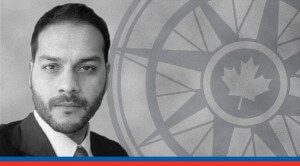 Munk Senior Fellow Shuvaloy Majumdar spoke about human rights in the Mideast at the International Centre for Human Rights on Dec. 3, 2017. We are pleased to present his written comments.
Munk Senior Fellow Shuvaloy Majumdar spoke about human rights in the Mideast at the International Centre for Human Rights on Dec. 3, 2017. We are pleased to present his written comments.
By Shuvaloy Majumdar, Dec. 12, 2017
Doorood Ba-ar Shoma (Greetings to all of you.)
It is a tremendous personal honour to be with you today to join the chorus of celebration for a truly remarkable man. Professor Payam Akhavan is a shining beacon for us all.
My compliments as well to my dear friend Ardeshir Zarezadeh for his steadfast leadership at the International Centre for Human Rights, and to everyone at the Centre for their work in enriching our national life, and our national commitment to freedom.
It is a special pleasure to join dear friends like James Bezan and Tony Clement tonight as well. As a lowly advisor, I had a front row view of the work they did fighting for freedom around the world — let us thank them again for their fearless spirit.
All of us gathered in this room appreciate the multidimensional nature of the modern Middle East.
We see tectonic reforms underway in the Bedouin society of Saudi Arabia, and a hardening agenda of destabilization among the leaders of Iran. We see traditional centres of Arab civilization reduced to dust in Damascus and Baghdad, and a complex tension of terrorism, tyranny and pluralism competing in Cairo. We see new fault lines of sectarian struggle emerging in Beirut, perhaps precipitating a new war against Israel.
Amid all this, it can be difficult to discern where the average citizen’s allegiance lies. Pew Research, however, has measured public opinion on the Arab street, and found young Arabs express greatest admiration for emerging islands of pluralism in Dubai and Abu Dhabi.
This is good news, but it’s easy to lose sight of, given the geopolitics of the Middle East forces our attention on the worst actors — namely, regimes that insist state terror is statecraft.
In this context, we too often find ourselves willing to sacrifice human rights in the name of safety and stability. The short-term interest is permitted to supersede greater values and truths. Yet true stability is built on a permanent foundation of human rights and the rule of law, not merely the temporary strength of any state or regime.
When we concede the centrality of human rights as the motive of our actions, we insist foreign policy be shaped by principles, and our priority becomes working on behalf of the most persecuted, even if that means unpopularity in multilateral spaces densely populated with the self-serving henchmen of those doing the persecuting.
Even as we emerge from some of the bloodiest conflicts the Middle East has endured, and even as dark clouds of war continue to gather on the horizon, the remarkable history of this region gives cause for hope.
In a glass case in the British Museum in London sits a cylinder made of cracked and faded clay. It is about the size and shape of a jar of olives, and its curved surface is inscribed with ancient Babylonian script. The translated text tells of a great king named Cyrus, whom the gods appointed to bring fair and just rule to ancient Persia after decades of tyranny.
Cyrus himself is quoted on the inscription, and though his specifics are archaic, the themes of his words are familiar. Men should not be slaves of their government. Citizens should enjoy freedom to worship as they see fit. Private property should never be seized without compensation.
Today, historians often mention the Cyrus cylinder in the same breath as the US Declaration of Independence and the French Declaration of the Rights of Man as pivotal documents in the evolution of human rights.
Priceless artifacts of this sort also serve as an important reminder that the Middle East is so much more than just the mire of war and dictatorship we see on the nightly news — it is a cradle of civilization, with traditions both religious and secular, to which mankind owes an impossible debt.
It’s for this reason that it should trouble the world and our political leaders far more than it does when we see this precious region defamed by the actions of wicked and violent men.
Slaughter and torture committed in the name of the Prophet Muhammad. Blood in the streets of the great cities of scripture. Attempts to exterminate pious communities whose customs of worship date back millennia.
And yes, a dictatorship of thugs occupying the government once held by Cyrus the Great in Tehran. A dictatorship that has not only helped lay waste to the ancient nation of Syria, but now seeks to destabilize the guardians of Mecca and of Jerusalem.
In the last decade, Canada has done much to stand with those who represent continuity with the true traditions of the ancient world, and against those who slander its legacy. We have been humble of our limitations, yet in spite of such challenges, we have accomplished much.
Let me share with you some specifics.
- We helped subvert the Iranian regime’s so-called Halal internet, helping over 4 million Iranians find freedom online, even while political space on the street is crushed by the regime.
- We established refugee programs for religious and sexual minorities facing great peril in Iran, Syria and Iraq.
- We exerted great effort to hold the regimes of Iran and Syria to account at the UN General Assembly, backing special resolution after special resolution condemning their atrocious human rights records – even while their propagandists launched a charm offensive towards Western media.
- We united an unprecedented network of countries committed to religious pluralism through our Office of Religious Freedoms, including the majority of the Muslim world.
- We condemned, in the clearest of terms, the systematic persecution of the Bahai and Jews, the Chaldeans and Copts, the Ismailis and Ahmadiyya, the Kurds and Assyrians.
- We invested – in real terms – toward the political and economic emancipation of over half the region’s population, one example in concentrating our aid to Afghanistan solely on the country’s women.
- As part of our commitment to the interests of women, peace and security, we ended funding for UN agencies that accomplished nothing and replaced it with smart investments in civil society led by indigenous voices.
At the Macdonald-Laurier Institute, we will continue to call upon Canadian leaders to support future efforts in the spirit of these. We will remain in common cause with anyone who seeks to build upon this legacy.
Yet when we look at the Canadian government today, there is reason to fear this country may be starting to soften in the places where we once stood firm. Middle Eastern politics is obviously deeply controversial, and I worry the contentious practice of doing what’s right — passing judgement, speaking forcefully, taking sides, committing resources — is giving way to the cheap popularity of bland rhetoric and feigned neutrality. This is the exact opposite of principled leadership, which never abdicates responsibility in the face of evil.
The current leadership in government has, in short, turned its back on human rights defenders, independent journalists, women seeking suffrage, champions of pluralism – and why? Presumably, for the sake of appeasing the world’s dictators into giving them a symbolic seat on the UN Security Council.
Real leadership means doing what we say, and ensuring what we say is heard in the deepest recesses of the darkest prisons. It means allying with those who dare to confront the terror of Hezbollah and Hamas. It means acting, and acting now, on behalf of the voiceless, whose hope hinges on our capacity for moral clarity, and not the cowardice of moral equivalence.
The problems of the Middle East will never be solved unless we respect it as a treasure worth saving. This requires being able to draw a thick line of distinction between the illegitimate tyrants and terrorists who too often govern the territories of the region, and the proud and noble people who are forced to toil beneath them.
It is in Iran, perhaps more than any other nation, where this fact is most true. The Iranian people are the heirs of a great Persian civilization. I have seen the imprints of this civilization from having lived in both Baghdad and Kabul. They are generous, inquisitive, artistic, and entrepreneurial, full of natural tolerance and joy for life. And yet they are forced to endure, as their representatives to the world, a cruel government – a clerical military dictatorship – that is none of these things.
Iranians are a proud people with good reason to be proud. It is my hope, and the hope of all of us here tonight, that one day soon the people of Iran, and indeed all peoples of the Middle East, will reclaim the ancient birthright which so many other nations take for granted.
The birthright carved in clay with the creed of Cyrus, carved in clay but inscribed into the hearts of all peoples by a greater creator: the concept of the individual as irreducible, indelible and indestructible.
Pride without qualification.
Patriotism without apology.
And the quiet confidence and peace of mind that comes from knowing the lands of so many of our friends, family, and ancestors is safe, prosperous, and free.
Thank you.
Shuvaloy Majumdar is a Munk Senior Fellow at the Macdonald Laurier Institute.




